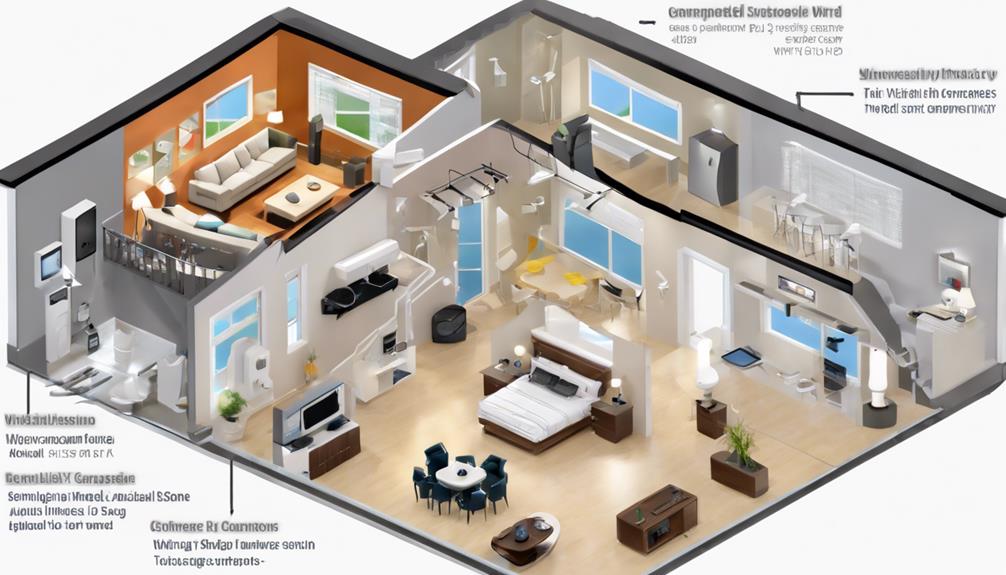When choosing between wired and wireless security systems for your home, assess connection stability and network security first. Wired systems offer reliable connectivity and better network security, but wireless ones are easier to install and offer flexibility. Wired systems may have higher upfront costs, while wireless ones tend to be more user-friendly with lower maintenance. Keep in mind that wireless systems can be more susceptible to interference, while wired systems may require professional installation. Understanding your needs and priorities will help you make the best choice.
Key Takeaways
- Consider wired systems for reliable connections and superior network security.
- Opt for wireless systems for easy installation, flexibility, and remote monitoring capabilities.
- Evaluate costs: wired systems have higher upfront fees, while wireless systems may have ongoing expenses.
- Assess maintenance needs: wired systems have lower upkeep, while wireless systems require battery replacements.
- Hybrid systems offer a mix of wired and wireless components for enhanced functionality and coverage.
Connection Stability
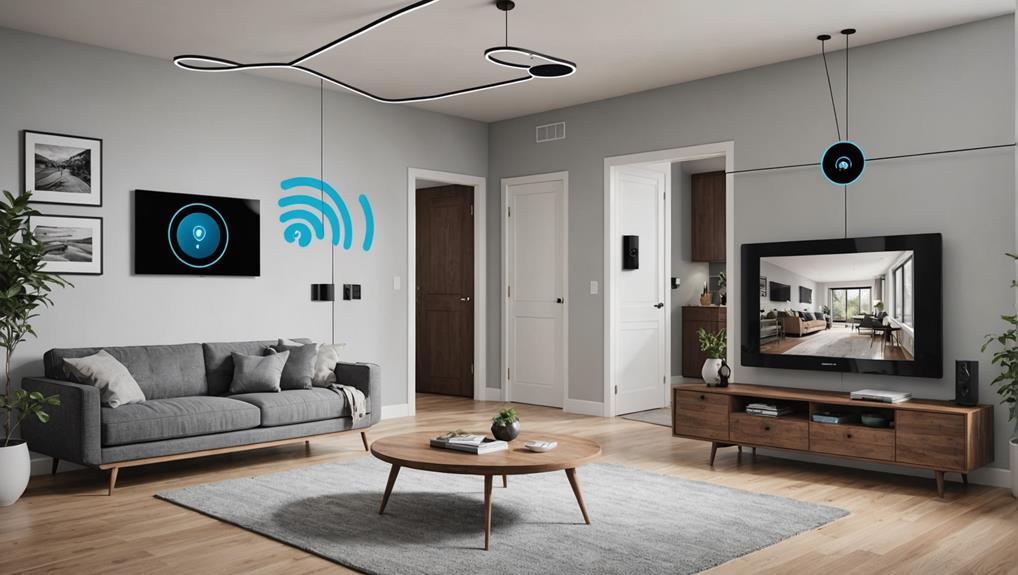
When deciding between wireless and wired security systems, one essential factor to take into account is connection stability.
Wired systems offer a reliable and robust connection that's less susceptible to disruptions caused by environmental factors or electronic interference. This guarantees consistent communication between sensors and the control panel, making wired security systems a dependable choice for home protection options.
In contrast, wireless systems, although convenient, can experience connectivity issues due to interference from household devices like microwaves. This may lead to interruptions in critical moments, compromising the effectiveness of the security system.
Additionally, the stability of wired connections enhances the reliability of video surveillance by maintaining consistent data transmission without the risk of signal loss.
Network Security
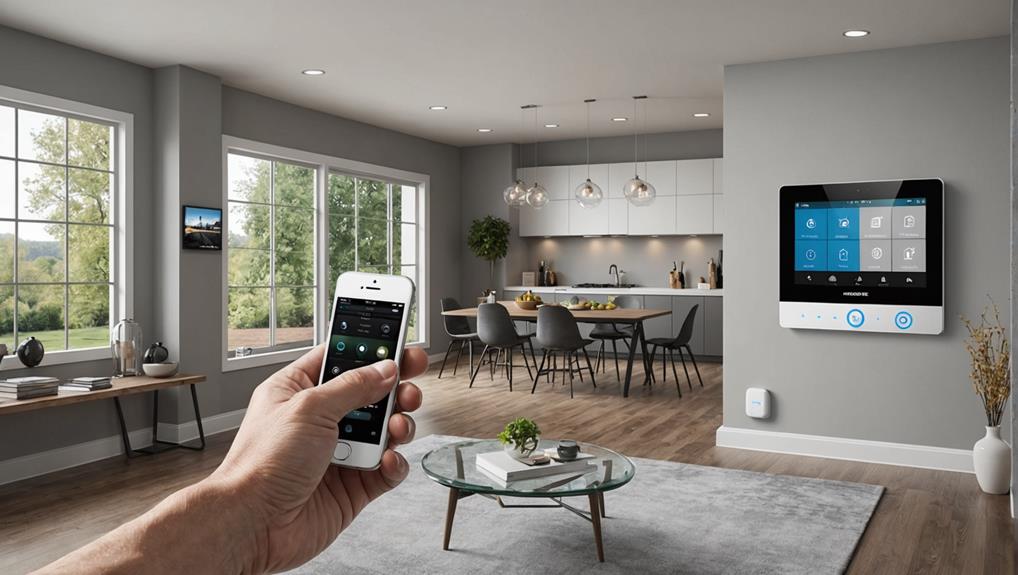
To guarantee robust network security in your security system, it's essential to take into account the differences between wired and wireless options when choosing home security systems.
Wired security systems offer superior network security, as they require physical access to the network for compromise, making them less vulnerable to remote hacking attempts. In contrast, wireless systems are more susceptible to interception and unauthorized access, especially if Wi-Fi security measures are lacking, increasing the risk of breaches.
Additionally, according to an analysis of wired versus wireless residential alarm systems, wired setups often have lower maintenance costs due to fewer components that could potentially fail.
A wired connection operates independently of external networks, ensuring consistent security monitoring without exposure to online threats.
Additionally, wired systems have local storage capabilities, reducing the potential for data breaches by eliminating dependency on cloud services that could be vulnerable to hacking.
Unlike wireless systems, which may experience disruptions due to network issues, wired systems maintain a stable connection unaffected by external interference, enhancing overall security reliability.
When making the wireless vs wired decision, prioritize network security to safeguard your home effectively.
Cost Comparison
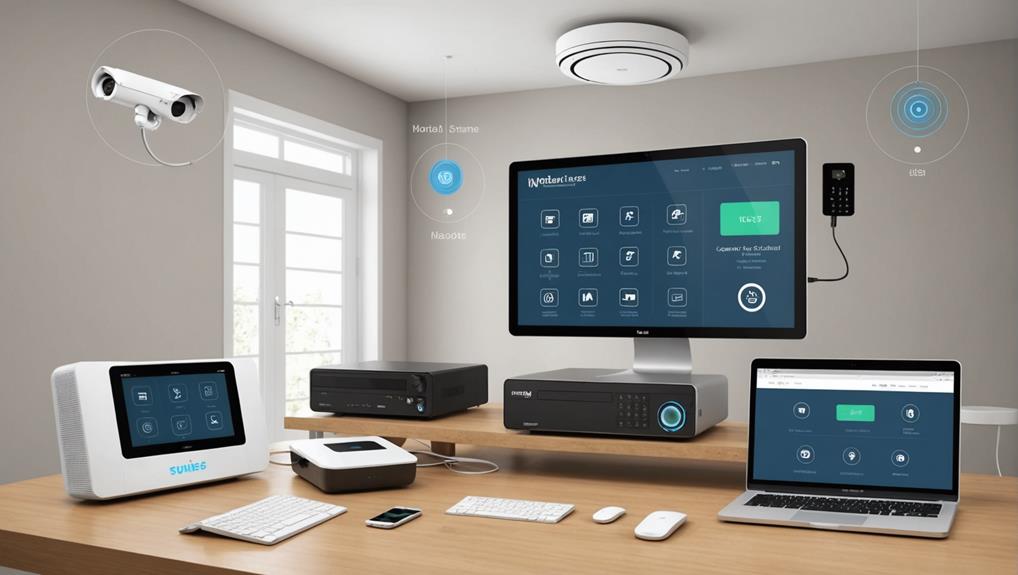
For homeowners evaluating security system options, considering the cost implications is essential. When it comes to selecting security systems, your home security needs and budget considerations play a significant role.
Wired security systems typically have higher upfront installation costs, averaging around $100, due to professional installation and cabling requirements. In contrast, wireless systems offer the flexibility of DIY installation, starting as low as $17.99/month for monitoring services like SimpliSafe. According to home security system costs, it's also important to factor in potential hidden fees like activation charges or additional equipment costs.
While wireless systems may have ongoing costs for cloud storage and monitoring, wired systems often provide local storage without recurring fees. Additionally, wireless systems might require regular battery replacements, increasing long-term expenses, whereas wired systems rely on a stable power source with minimal maintenance.
Although wired systems have higher initial setup costs, their long-term reliability and lack of cloud storage fees can make them a more cost-effective option for homeowners with larger properties.
Consider your long-term budget when deciding between the two systems to guarantee you meet your home security needs economically.
Installation Ease
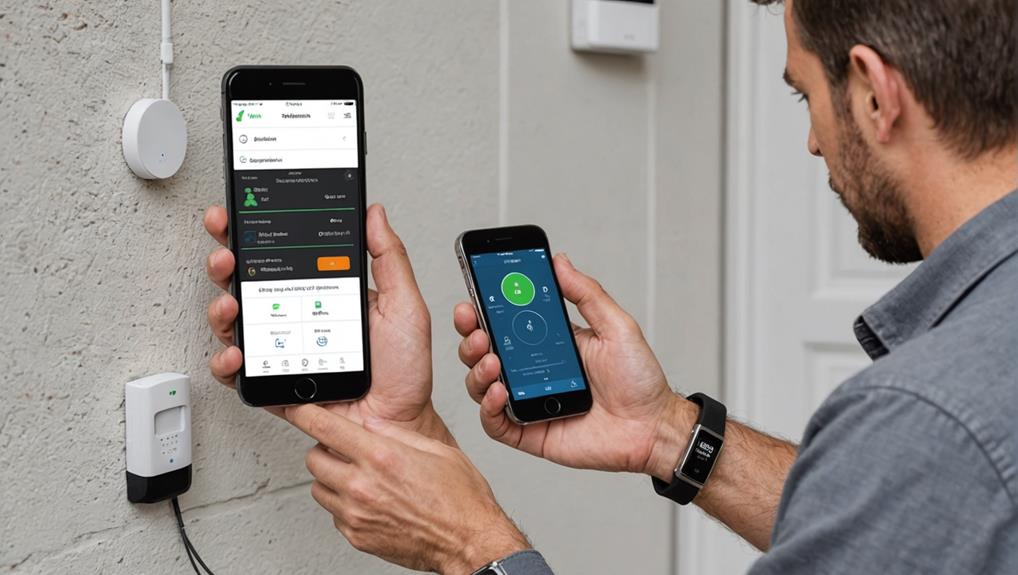
Setting up a wireless security system is a breeze compared to the intricate process of installing a wired system.
With wireless systems, you can easily place devices without dealing with complex wiring or hiring professionals.
According to comparative analysis of wireless and wired security systems for residential properties, wireless solutions offer significant flexibility regarding placement and expansion.
This convenience makes wireless systems a popular choice for those seeking a hassle-free security solution.
Installation Simplicity
Opting for a security system that aligns with your installation capabilities can make a significant difference in your overall experience.
When considering installation simplicity, here are some key points to keep in mind:
- Wireless systems: Easy to set up without professional help, ideal for quick installations.
- Wired systems: Often require professional installation due to cable complexities.
- Power over Ethernet (PoE) technology: Simplifies wired installations by combining power and data transmission.
- Relocation ease: Wireless systems can be conveniently moved when changing homes.
Understanding the differences in installation processes between wireless and wired security systems can help you choose the option that best fits your needs.
For a hassle-free and quick setup, wireless systems are a great choice, especially for renters or those seeking flexibility.
On the other hand, if you're looking for a more permanent solution and willing to invest in professional help, a wired system might be the better fit.
Setup Convenience
Ease of setting up a security system can greatly impact your experience. When considering setup convenience, wireless security systems shine with their simple installation process.
These systems often support a DIY approach, eliminating the need for extensive wiring or wall modifications. With wireless options being battery-operated, you can easily place them wherever needed without worrying about proximity to electrical outlets.
On the other hand, wired systems usually require professional installation due to cable complexities and connectivity requirements. Wired setups may involve invasive methods like drilling or wall alterations, which can pose challenges for renters.
Additionally, wireless systems offer flexibility as they can be relocated effortlessly, whereas wired systems are more permanent fixtures in a home.
Prioritizing setup convenience in your decision-making process can lead to a smoother and more tailored security system installation experience for your home.
Maintenance Requirements
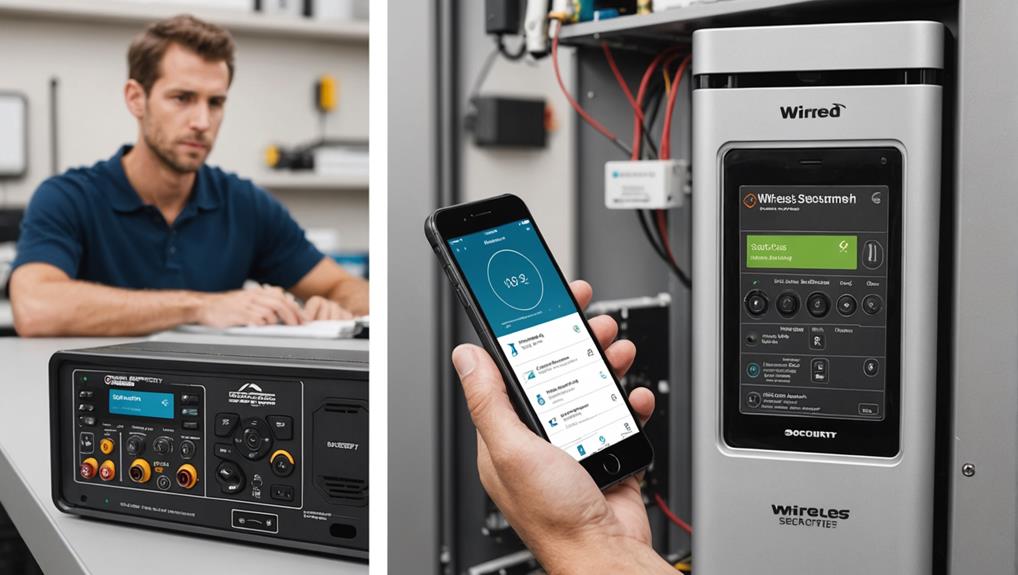
When considering the maintenance requirements of security systems, it's essential to weigh the differences between wired and wireless options. Here are some key points to keep in mind:
- Wired systems:
- Require minimal maintenance post-installation due to their stable connection and lack of battery reliance.
- May need occasional inspections for wiring integrity but generally offer low ongoing maintenance needs.
- Are more secure from signal interference, which is a significant advantage in environments with many electronic devices.
- Wireless systems:
- Necessitate regular battery checks and replacements to prevent system failures.
- Can face troubleshooting for signal interference and connectivity issues influenced by environmental factors.
It's important to note that wired systems eliminate the need for costly cloud storage subscriptions, reducing long-term maintenance costs.
On the other hand, wireless systems may require firmware updates and compatibility checks with smart devices, adding an extra layer of maintenance compared to their wired counterparts.
Relocation Flexibility
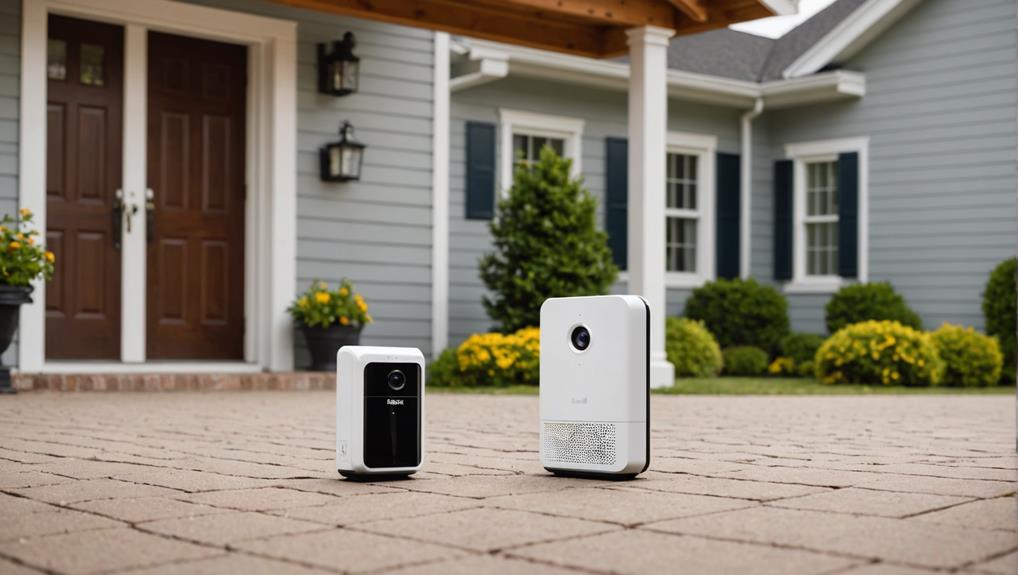
For users seeking flexibility in relocating their security systems, wireless options present a convenient solution. Wireless security systems offer portability, allowing you to move devices without the hassle of rewiring or professional installation. This is especially beneficial for renters or those who frequently change residences. In contrast, wired systems can be challenging to remove and may cause damage during relocation. The adaptability of wireless systems lets you customize your security setup to different home layouts easily.
| Relocation Flexibility | Wireless Systems | Wired Systems |
|---|---|---|
| Portability | Easy to move devices without rewiring | Challenging to relocate, may cause damage |
| Installation | Quick setup for moving homes | Requires professional installation |
| Customization | Adaptable to different layouts | Limited by fixed wiring |
| Expandability | Can add devices easily | Limited by existing cable lengths |
System Customization
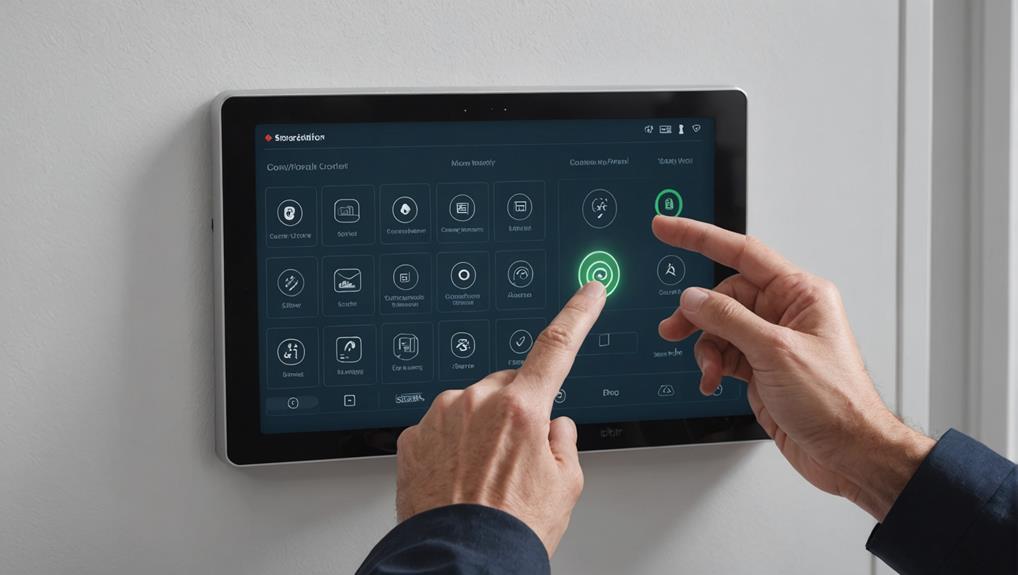
Enhancing your security system with personalized features is a key benefit of wireless technology. When considering system customization, wireless systems offer a range of options tailored to suit your specific needs:
- Seamless Integration: Easily add new devices and technologies without extensive wiring, ensuring upgrades are hassle-free. For more on integrating smart home technology, explore smart tech integration.
- Cloud Storage: Tailor your security system with features like real-time monitoring and customizable alerts through cloud storage options.
- Flexible Automation: Personalize security settings through mobile apps, enabling tailored automation for lights, thermostats, and other smart home devices.
- Hybrid Solutions: Combine wired and wireless components for flexibility in customization while maintaining reliability and ease of use across various devices.
Wireless systems empower you to adapt your security setup as needed, providing a customizable and user-friendly experience that caters to your preferences.
Whether it's integrating new devices or customizing alerts, wireless technology offers a versatile solution for personalized security.
Monitoring Options
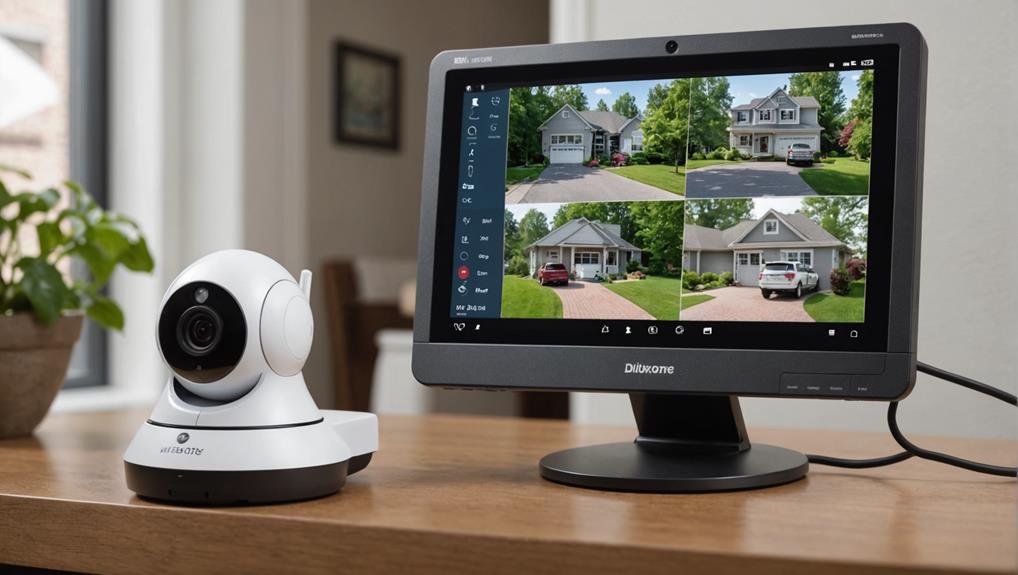
When considering monitoring options for your security system, it's crucial to weigh the technology choices, alert notification methods, and remote monitoring capabilities. These factors can greatly impact the responsiveness and reliability of your system in detecting and addressing security threats.
For instance, wireless security systems often offer more flexibility in installation and ease of relocation compared to wired systems. However, they may also encounter issues like signal interference or battery life concerns.
Whether you opt for wired or wireless, understanding the monitoring options available can help you make an informed decision that suits your security needs.
Monitoring Technology Options
Consider the monitoring technology options available when choosing between wireless and wired security systems.
- Wired Systems: Provide stable communication via phone lines or Ethernet, guaranteeing reliability with direct connections to monitoring centers for prompt emergency response.
- Wireless Systems: Utilize cellular technology for remote monitoring, offering interactive features like real-time alerts and live video feeds through mobile apps, despite potential signal interference.
- Professional Monitoring: Wired systems often offer 24/7 surveillance with direct links to authorities, while wireless systems can grant remote access from anywhere with an internet connection.
- ADT Solutions: ADT offers both wired and wireless monitoring options, allowing you to select the best fit for your connectivity and security requirements.
When deciding on a security system, weigh the benefits of each monitoring technology option against your specific needs for connectivity, reliability, and remote access to guarantee your home's safety and your peace of mind.
System Alert Notifications
For effective security monitoring, alert notifications play an essential role in keeping you informed of potential threats or incidents. When deciding between wired and wireless security systems, it's vital to reflect on how each handles alert notifications. Wired systems typically use phone lines or Ethernet connections, ensuring reliability even during power outages. On the other hand, wireless systems rely on cellular or internet connections for notifications, offering real-time alerts through mobile apps, texts, or calls. While wired systems provide local storage for video footage and uninterrupted access to recorded events, wireless systems may feature two-way communication for enhanced monitoring capabilities and remote interaction.
Examine the table below to compare how wired and wireless security systems handle alert notifications:
| Wired Systems | Wireless Systems | |
|---|---|---|
| Alert Notification | Phone lines or Ethernet connections | Cellular or internet connections |
| Real-time Alerts | Limited | Mobile apps, texts, calls |
| Local Storage | Yes | Limited |
| Two-way Communication | No | Yes |
| Professional Monitoring | Available | Available |
Remote Monitoring Capabilities
To further explore the remote monitoring capabilities of security systems, it's important to understand how these systems offer various monitoring options for users.
Here are some key points to take into account:
- Wireless systems: Utilize mobile apps for real-time alerts and live video feeds accessible from anywhere with an internet connection.
- Smart home integration: Many wired systems can connect with smart home technology for remote access and monitoring, though additional components or services may be needed.
- Storage options: Wireless systems often offer cloud storage with monthly fees, while wired systems allow local video storage without ongoing costs.
- Internet stability: Wired systems providing remote access features may require a stable internet connection for effective data transmission to user devices.
Taking into account these options, wireless systems offer convenient mobile access and advanced features, while wired systems may require a bit more setup but can provide cost-effective monitoring solutions for your home security needs.
Integration Possibilities

When looking at integration possibilities between wireless and wired security systems, it's vital to evaluate how each type can work together seamlessly to enhance your home's protection and automation capabilities.
Hybrid systems, which combine existing wired setups with new wireless components, offer enhanced functionality and smart home device integration. Additionally, hybrid systems can take advantage of the strengths of each type, providing robust coverage and reliability.
Wireless systems excel in smart home compatibility, allowing for customizable automation options that wired systems may lack. Their upgrade flexibility enables easy additions of new devices as technology advances, unlike wired systems that may need extensive retrofitting.
However, older wired systems could face integration challenges with modern smart home technologies, emphasizing the importance of reviewing existing infrastructure.
Seeking professional support from companies like ADT can guide homeowners in integrating both wired and wireless solutions tailored to their specific needs and lifestyle.
Frequently Asked Questions
Is It Better to Have a Wired or Wireless Security System?
When deciding between wired and wireless security systems, consider your specific needs.
Wired systems offer reliable connectivity and no ongoing cloud storage costs.
Wireless systems provide easy installation and portability.
Keep in mind that wired systems are less susceptible to interference and hacking, while wireless systems may require monthly subscriptions for video storage.
Assess your priorities for stability, convenience, and long-term expenses before making a choice.
What Is the Downside to Wifi Security Cameras?
When considering Wi-Fi security cameras, it's vital to be aware of potential downsides.
These cameras can be susceptible to hacking if network security isn't robust. Maintenance is essential for battery-powered devices to prevent outages.
Environmental factors like weather and interference can disrupt wireless signals. Additionally, ongoing costs for cloud storage subscriptions may be required.
Loss of internet connectivity can also impact camera performance during important events.
What Are the Disadvantages of Wireless Alarm System?
When considering wireless alarm systems, remember they rely on batteries that need regular maintenance to prevent outages, potentially leaving your home vulnerable.
These systems can be affected by radio wave interference from household devices like microwaves, leading to false alarms or signal loss.
Additionally, weather conditions like heavy rain or snow may disrupt wireless signals, causing potential system failures when you need them most.
Guarantee strategic sensor placement for maximum coverage and bolster Wi-Fi security to prevent hacking risks.
Are ADT Systems Wired or Wireless?
ADT systems can be both wired and wireless, giving you options to suit your needs.
The wired systems offer stability and reliability with discreet wiring for sensor connections. On the other hand, the wireless systems feature advanced technology for easy installation and integration with smart home devices.
Both wired and wireless solutions from ADT include professional monitoring services for added security with real-time alerts and support.
Hybrid options combine wired infrastructure with wireless components for custom security solutions.
Conclusion
In summary, when deciding between wireless and wired security systems for your home, consider factors such as connection stability, network security, cost, installation ease, maintenance, relocation flexibility, system customization, monitoring options, and integration possibilities. Each type has its own advantages and disadvantages, so choose the option that best fits your needs and preferences. Ultimately, the most important thing is to guarantee the security and safety of your home and loved ones.

